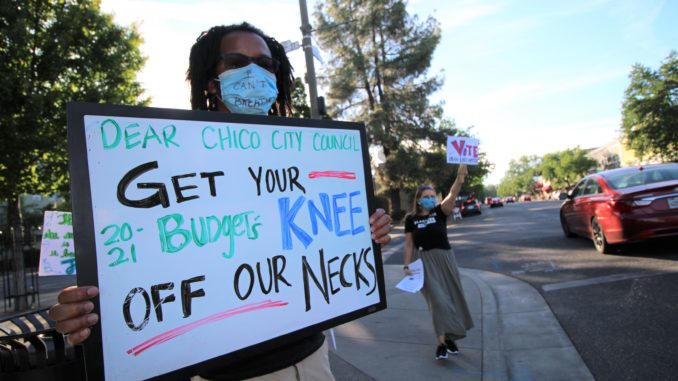
It didn’t happen in 2013, when Chico police officers fired 19 shots at the car driven by Breanne Sharpe, killing the 19-year-old and sending bullets into a bus stop, a parked car and a residential garage. And it didn’t happen in 2017, when Desmond Phillips, 25, and Tyler Rushing, 34, were shot to death by officers less than four months apart.
But the May 25 killing of George Floyd by Minneapolis police officers halfway across the country—and the ongoing nationwide and local cries for police reform and the redress of systemic racism that have followed—finally pushed the Chico City Council to take a closer look at policing in its own community.
That action came in the form of two separate motions passed at the council’s meeting last Tuesday (June 23). One effort, proposed by Mayor Ann Schwab, is the formation of an ad-hoc committee to review the Chico Police Department’s policies and training; the second, brought forth by Vice Mayor Alex Brown, directed a complete accounting of officer training and the possible introduction of new training requirements.
The movement comes years after police watchdog groups, including Justice for Desmond Phillips and Concerned Citizens for Justice, began attending council meetings to lobby for reform, and amid the search for a new police chief, pandemic-triggered budget adjustments and demonstrations calling for the city to “defund” the police department.
The mayor’s committee has been criticized by people on both sides of policing issues, with public safety advocates calling it a distraction from Chico’s homeless and crime issues, and reform advocates saying it falls short of the citizen oversight they’ve long demanded. Of particular concern to the latter faction is the committee’s makeup, which some claim is lopsided with law enforcement proponents.
“The absolute insult of a committee stacked with the very people being reviewed while we are in a moment of deep reckoning is unbelievable,” Eric Chisler wrote in an online public comment (council meetings are currently closed to the public due to COVID-19).
At the City Council meeting, Schwab introduced her plan to form the committee by saying she recently signed the My Brother’s Keeper Pledge for mayors, an action by the Obama Foundation that asks city leaders to commit to reviewing their local police department’s use-of-force policies, training and culture. The pledge also calls for public engagement and reports on the impact of those policies and, when necessary, reform.
As first pitched, the group would consist of the mayor, Councilmembers Kasey Reynolds and Scott Huber, the police chief, two members of the Chico Police Officers’ Association (the labor union representing CPD officers) and three community members chosen by the participating council members.
Brown immediately voiced objections to that approach. She noted that discussions on three other important topics currently in committee—cannabis, tenants’ rights and housing—are dragging and take place outside of the public eye. She also asked that—as a social worker, the council’s most outspoken member on policing issues, and the board’s only LGBTQ member—she be included in the group.
The motion passed with several added caveats for the committee: Brown will take one of the councilmember spots (and Schwab will re-pick the other), at least six public meetings will be held, and the findings will be presented to the council within 90 days.
Brown’s proposal calls for a full rundown of officer training with a specific focus on the areas of implicit bias, de-escalation and crisis intervention training (CIT). The latter is in reference to the interaction police have with people with mental illness. Such training has been central to public discourse on police reform as it related to the killings of Rushing, and Phillips.
She also directed the department to explore the costs and impacts of requiring all CPD officers to participate in ongoing implicit bias training every other year and complete a 40-hour CIT course known as the Memphis Model within two years. CPD will present this information to the council in October.
Interviewed Friday (June 26), Brown further explained her opposition to the committee plan but why she fought to be on it: “We’re at a time our community is asking us to be forthright and transparent and public with conversations about police reform.
“What the mayor proposed feels like more of a one-way educational effort for the community to sit down with police and learn from them, rather than have a mutual and generative platform to actually move legitimate ideas forward.”
The idea of defunding police departments has taken hold among reform advocates in Chico, where the CPD accounts for nearly 50 percent of the city’s budget. After receiving hundreds of emails in favor of cutting police funds on the runup to its June 9 meeting, the City Council approved the 2020-21 budget without any changes to CPD’s allocation. However, the panel plans to revisit the budget in October, with a deep dive into each department’s budgets, including proposed cuts.
Since that date, a newly formed police reform group called the Chico Community Assembly has been meeting at the Chico City Plaza each time the council convenes. One of the group’s main efforts is exploring how defunding could lead to less police violence and more social services.
During a recent interview, Cory Hunt, one of the group’s facilitators, explained that the concept doesn’t have to mean a total departmental dismantling: “When we say ‘defund’ we’re talking about doing the same thing they’ve been doing to the education system for years,” he said. “We’re saying let’s flip the switch there … that maybe we’ve gone overboard on the police funding and now it’s time to invest at least some of those resources back into the community.
“There’s never going to be enough money for everything, but if things are going to keep falling short, it shouldn’t be to support police budgets and huge pensions.”
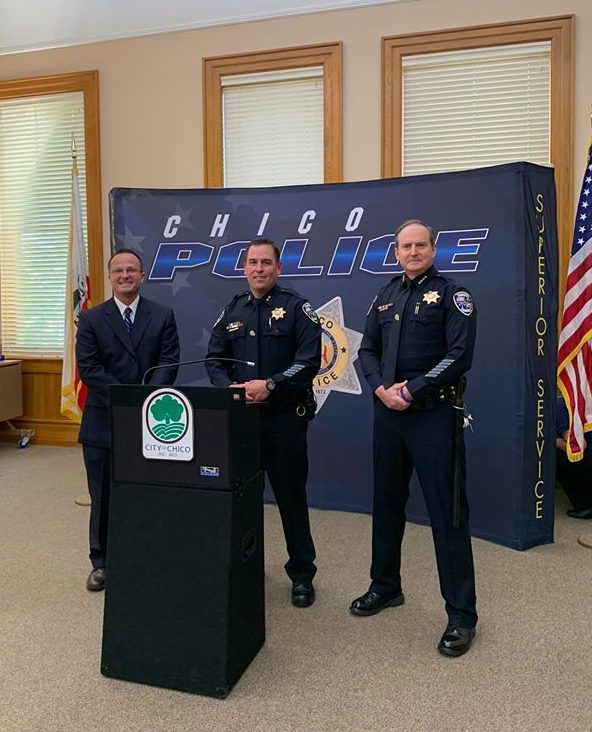
Interviewed by phone, CPD Interim Chief Matt Madden expressed concerns about defunding.
“I think people need to be cautious when they talk about those things if they don’t have a total understanding of what the police budget does,” he said. “On one hand we’re hearing about more training, but training is expensive, so you have to be aware of all of the impacts. It’s a slippery slope.”
Madden pointed out that the economic recession has triggered a hiring freeze, including for eight vacant police officer positions.
“We’re understaffed here and we have been since the Great Recession, so to start having conversations about diverting money to some other department or this and that makes me very concerned,” he said.
Madden said he welcomes deeper community review of local police policies, and spoke glowingly of the department where he’s spent 23 of his 28 years in law enforcement. He insisted the CPD is completely free of all forms of racism, touted its transparency and said the department’s standards meet or exceed the most rigorous requirements.
“There’s no better time to have these discussions and start building stronger relationships between the police and the community than now,” he said. “Do I think we need to look at them and continue to evaluate [CPD policies]? Yes, I do.
“On the other hand, do I believe our polices and training currently align with state and federal laws and standards? The answer to that is also, ‘Yes, I do.’”

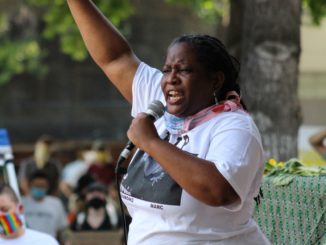
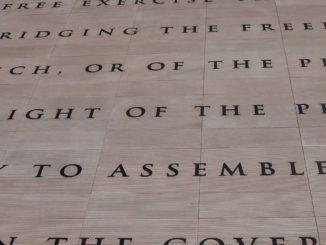
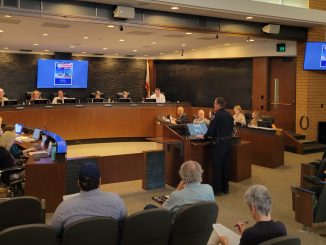
Because state and federal standards seem to be working really well…